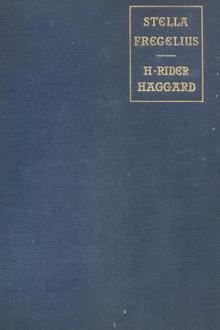Stella Fregelius by H. Rider Haggard (no david read aloud .TXT) 📕

- Author: H. Rider Haggard
- Performer: -
Book online «Stella Fregelius by H. Rider Haggard (no david read aloud .TXT) 📕». Author H. Rider Haggard
"Ah! that's just like you, if you will forgive my saying so. You takeany amount of trouble to invent and perfect a thing, but when it comesto making use of it, then you forget," and with a little gesture ofimpatience the Colonel turned aside to light a match from a box whichhe had found in the pocket of his cape.
"I am sorry," said Morris, with a sigh, "but I am afraid it is true.When one's mind is very fully occupied with one thing----" and hebroke off.
"Ah! that's it, Morris, that's it," said the Colonel, seating himselfupon a garden chair; "this hobby-horse of yours is carrying you--tothe devil, and your family with you. I don't want to be rough, but itis time that I spoke plain. Let's see, how long is it since you leftthe London firm?"
"Nine years this autumn," answered Morris, setting his mouth a little,for he knew what was coming. The port drunk after claret had upset hisfather's digestion and ruffled his temper. This meant that to him--Morris--Fate had appoin





Comments (0)